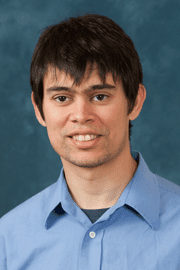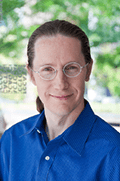Media Contact:
Nalini Padmanabhan
ASHG Communications Manager
301.634.7346
press@ashg.org
For Immediate Release
Wednesday, July 2, 2014
1:00 pm U.S. Eastern Time (UTC-05:00)
Early-Career Geneticists to Receive Award at ASHG 2014 Annual Meeting
BETHESDA, MD –The American Society of Human Genetics (ASHG) has named Gonçalo R. Abecasis, DPhil, Felix Moore Collegiate Professor of Biostatistics at the University of Michigan School of Public Health (U-M SPH); and Mark J. Daly, PhD, Associate Professor of Medicine and Chief of the Analytic and Translational Genetics Unit at Massachusetts General Hospital (MGH)/Harvard Medical School and Senior Associate Member of the Broad Institute, as the 2014 recipients of the Curt Stern Award.
This annual award, named for the late pioneering geneticist Curt Stern, PhD, recognizes genetics and genomics researchers who have made significant scientific contributions during the past decade. ASHG will present the award, which will include a crystal plaque and $5,000 cash prize to each awardee, on Monday, October 20, during the organization’s 64th Annual Meeting in San Diego.

Dr. Abecasis has developed statistical and mathematical methods for the analysis of genetic data that have evolved into standard tools in human genetics. In an era of exponential growth in genetic data, his software helps geneticists analyze studies of families and unrelated individuals, characterize variation among genomes, study connections between genetic variation and human disease, and integrate information across gene-mapping studies. He has also led scientific consortia studying a variety of human traits, such as age-related macular degeneration, heart disease, and metabolic disease. Dr. Abecasis is currently deploying next-generation sequencing technology to study the genomes of thousands of people, with the aim of better understanding genetic variation and human disease biology.
In 2008, Dr. Abecasis received the U-M SPH Excellence in Research Award and in 2013, he received the Overton Prize from the International Society for Computational Biology. He also served as Associate Editor of The American Journal of Human Genetics from 2005-2007 and belonged to the ASHG Awards Committee from 2011-2013.

Dr. Daly has made key advances in the genetic mapping of common diseases, including the development of the first human genome maps of single-nucleotide polymorphisms, tiny genetic variations that can help scientists track inherited traits to nearby genes and uncover how those genes affect human health. He also helped establish a framework for the association of portions of the genome to complex disease risk and the regulation of gene expression.
A leader in gene discovery, Dr. Daly has led consortia of scientists collaborating on efforts to build maps of genomes as well as consortia studying inflammatory bowel disease, autism and schizophrenia that have made substantial progress in identifying genes using a variety of techniques. He has also contributed to numerous statistical methods and software tools that are routinely used by human geneticists worldwide, and in 2010 was named founding chief of the Analytic and Translational Genetics Unit at MGH. At the Broad Institute, he serves as co-director of the Medical and Population Genetics Program, and is a member of the Broad’s Stanley Center for Psychiatric Research.
Publisher Thomson-Reuters has listed both Dr. Abecasis and Dr. Daly multiple times among the world’s most cited scientific authors. They worked together on the International HapMap Project, an effort to catalog genetic similarities and differences among humans, and the 1000 Genomes Project, an effort to identify genetic variants present in at least 1% of the population. Both awardees have also made substantial contributions to ASHG, as longtime members of the Society and frequent presenters at its Annual Meeting
About the American Society of Human Genetics (ASHG)
Founded in 1948, the American Society of Human Genetics is the primary professional membership organization for human genetics specialists worldwide. Its nearly 8,000 members include researchers, academicians, clinicians, laboratory practice professionals, genetic counselors, nurses, and others with an interest in human genetics. The Society serves scientists, health professionals, and the public by providing forums to: (1) share research results through the ASHG Annual Meeting and in The American Journal of Human Genetics; (2) advance genetic research by advocating for research support; (3) educate current and future genetics professionals, health care providers, advocates, policymakers, educators, students, and the public about all aspects of human genetics; and (4) promote genetic services and support responsible social and scientific policies. For more information, visit: http://www.ashg.org.
9650 Rockville Pike | Bethesda, MD 20814 | 301.634.7300 | society@ashg.org | www.ashg.org
Connect with ASHG on Twitter (@GeneticsSociety) | Facebook | LinkedIn
